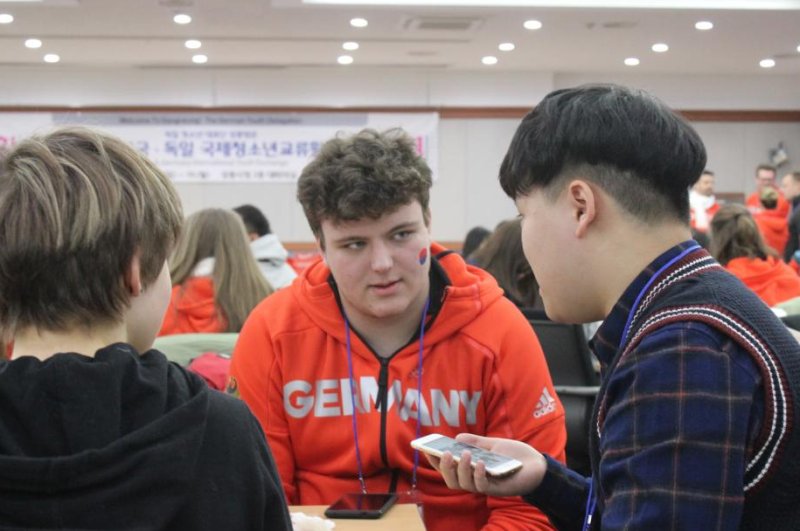1 of 2 | Voelkner Maximilian, 17, listens to South Korean peer Lee Hee-chan, 17, during an international youth exchange in Gangneung, South Korea. Photo by Elizabeth Shim/UPI
GANGNEUNG, South Korea, Feb. 19 (UPI) -- Germany's experience with unification may not be the best predictor of what could happen next on the Korean peninsula, a visiting German sports director said, as German, South Korean teens met to forge new friendships during an international youth exchange.
Tobias Knoch, 41, told UPI the visit involving about 40 German teenagers with the German Olympic Academy is "valuable" because his students were born after unification, and have no memory of the struggle to bring together two systems, East and West, in the aftermath of the Cold War.
But Knoch said Sunday he remembers the period well -- an era defined by exuberance but also trials and tribulations.
"The 1989 German unification made a lot of people happy. Separated families could meet," Knoch said. "Getting the two systems to work together, however, took a lot of time."
Knoch said the biggest challenges for the Koreas is overcoming greater economic disparities and a longer period of separation.
"The gap between the two Germanys was smaller than the gap between North and South Korea so it was less of a challenge," he said. "[The Koreans] must make a lot of effort to mitigate the challenges."
He also added Germany's cause was helped by the historic collapse of Communism across Eastern Europe, which provided pan-European support for unification.
No such consensus currently exists in Northeast Asia, where powerful countries, including China, Japan and even Russia, maintain a cautious rivalry for economic dominance and political clout.
Knoch's sobering assessment is being offered as North and South continue a pattern of rapprochement that began in January with high-level talks that have, so far, culminated in North Korea's participation in the South-hosted Winter Games.
The Olympics was supposed to be South Korea's moment to shine on the world stage. Two weeks into the games, it is clear the South's Gangwon Province has delivered on that promise.
South Korean residents of the relatively rural area have been quick to respond to the influx of foreigners arriving on the newly built KTX bullet train, greeting the arrivals at terminals or providing directions in subzero-degree weather.
Lee Hee-chan, 17, a high school student in Gangneung who was part of the South Korean youth group welcoming the Germans on Sunday, told UPI he jumped at the chance to help foreign peers learn about his country.
Brushing aside the initially awkward encounters that had taken place among the teens, amid gift exchanges, face painting and K-pop dancing demonstrations, Lee said he was impressed with the group.
"I was giving them their name badges. Normally Koreans they'd just take it and go, but the Germans are polite and say 'thank you'," Lee said. "So I thought it would not be hard to get along with them, and make new friends."
While friendship with teens from distant Germany appealed to Lee, the promise of better relations with more proximal North Koreans seems farther away.
Lee, who said he was encouraged by North Korea's participation in the Winter Games, added his friends are "don't think like that" and are wary of the North.
"'Korea is a first-world country, so we need to save it,' that's what friends say, they think about [the North] negatively," he said, referring to the potential financial burden on South Koreans in the event of unification.
The group later visited Unification Park in nearby Jeongdong-jin, because it was a stopover they specifically requested, a Gangneung official told UPI.
On display were a retired South Korean warship, a North Korean submarine captured in 1996, and a North Korean fishing vessel that carried defectors in 2009.
As the theme song for the 1981 Bond movie For Your Eyes Only wafted through the speakers of the warship, the teens mingled and laughed while a local guide tried to explain to the distracted visitors South Korea's naval history.
Voelkner Maximilian, 17, said the visit marks the first time he has left Germany, where he is enrolled in a practical training program to become an air-conditioning engineer.
The Stuttgart native, who has no plans to go to university, said he is too young to remember unification or the struggles of his parents' generation at a critical time.
Maximilian said he did hear something about a "big party that followed after the [Berlin] wall was opened" in 1989.
"I hope they come together, North and South, and there is one Korea."















